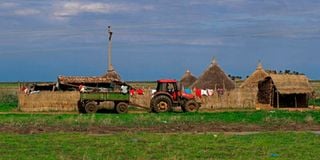Premium
Crossing cultures: From Addis to Khartoum

Huts along the highway that connects Sudan’s southern Blue Nile state to the capital Khartoum.
It was my first travel out of Kenya since the Covid outbreak. The trip started well: the thrill of taking the expressway to the airport at first light and seeing Nairobi from a very different perspective.
KQ 400 was on time; the flying was smooth; the on-board food was a let-down. We arrived to a cold and wet Addis Ababa, but the greetings by the Hilton staff were warming. ‘Welcome back!’ the concierge said. Had he really remembered me from my previous visits – the last one at least 10 years ago? After two other staff said the same thing, I realised it was a training directive.
But I really was glad to be back. The hotel has changed little over the intervening years. The spacious lobby is still a popular meeting place. Its chairs and tables are in the same places; the long bar tempts you to stay a while before walking on to the bedrooms. The wide window of my own room looked out over a green lush of trees surrounding the swimming pool and tennis courts. Perhaps it is time for a refit, but the Addis Hilton will hopefully remain a green oasis in the midst of the city’s rising concrete blocks and ever-busier tarmacked streets.
It was a workshopping trip, with little time for diversions. But for one of the three evenings there, we all went out – visiting consultants and local participants – to the famous Habesha Cultural Restaurant. It has a barn-like dining room with tightly packed tables and chairs; because it’s clearly a popular place for locals as well as tourists. On the stage, throughout the evening, a troupe of men and women perform traditional songs and dances. At the far end, there is the buffet – a bewildering array of traditional dishes. In an alcove on your way out, you can enjoy the ritual serving of strong Ethiopian coffee.
A day later, we were on our way out to the heat of Khartoum – we were hit by a high 30 degrees when we descended the aircraft steps. I wished we were staying in the Grand Hotel on the banks of the Nile. I would have looked out for the man I called Mr Fawlty some 20 years ago.
Fawlty Towers
Given the time lapse, I think I can tell the story again. At check-in, I asked the receptionist if I could have a room overlooking the Nile. ‘Possibly, Sir,’ he said. As soon as I entered my given room, I opened the window to find that it looked out to a black wall less than a metre away. I went down and challenged the receptionist. ‘I said possibly’, was his response. Back in the room, I turned on the bath taps. What came out was muddy water. Down I went again to Reception. I explained about the mud. ‘You could try the swimming pool, Sir.’ He quipped. But he did change my room.
No, this time we were at the much newer Al Salam. It is no Fawlty Towers; on the contrary, it is one of the most elegant hotels I have ever stayed in. The walls are hung with photographs of old Sudan and with examples of Sudan’s contemporary artists; the floors are polished marble; the main dining room has sumptuous displays of soups, salads, cold meats, cheeses, fruits, breads and sticky cakes.
We were mindful that Sudan is still in the grip of a military coup. But my Sudanese colleague drove us out to Omdurman one evening. He showed us where the Blue Nile joins the White Nile; he pointed out the fort where the besieged General Gordon was speared to death during the Mahdi uprising. And, in the cool of the evening, we enjoyed taking tea in a café beside the great river.
There is much more to explore in Sudan. On the next visit, if the politics allow, I will find more time.
John fox is Chairman of iDC Email: [email protected]





